Moment Lady Told Future Roommate To Either Take Her Cat To The Vet Or She Won't Move In With Her
Due to their lack of exposure to potentially dangerous wild animals or odd incidents that more frequently happen outdoors, indoor cats may require fewer medical interventions than outdoor cats. For indoor cats, dental cleaning and spaying or neutering are the two most common medical treatments.
It's ideal to acclimate your indoor cat to the cat carrier at least a few days before your vet visit. Some recommend placing food or toys inside to make it more enticing for your cat and lining it with blankets or a bed to make it more comfortable.
When your cat explores the carrier, reward them with treats, pets, and praise to help them associate it with positive experiences. Additionally, while being transported and while waiting in the waiting area, it is crucial to keep your cat in the carrier at all times.
This will lessen the chance of your cat running away or getting hurt while visiting the veterinarian, but the OP's friend neglected all these recommendations as she refused to take her cat to the vet for over a year. According to her, it’s basically impossible to get the cat into a carrier and out of the house.
The OP refused to move in with this friend until she took her cat to the vet, but the friend is still standing her ground.
Is the OP the AH for giving her future roommate this option...

OP's friend says the cat just runs away, hisses at her, scratches her, and she feels bad about putting her cat in a carrier.
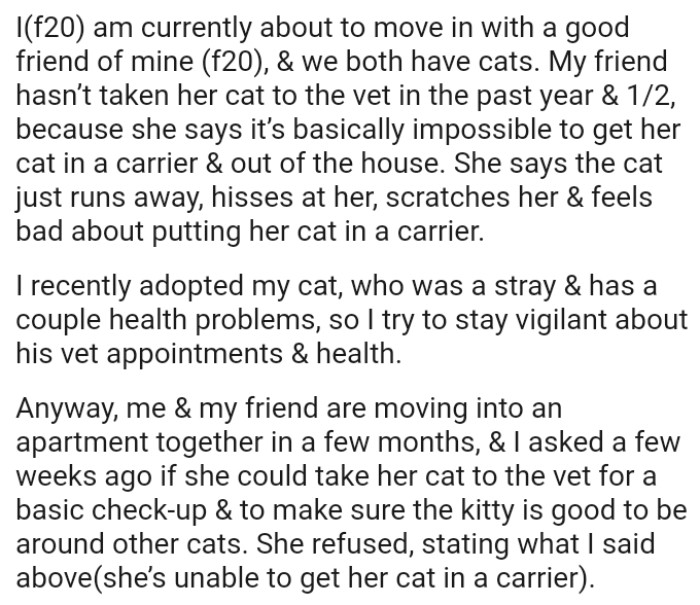
The OP insisted that she would not be moving in with her if she did not take her cat to see the vet.
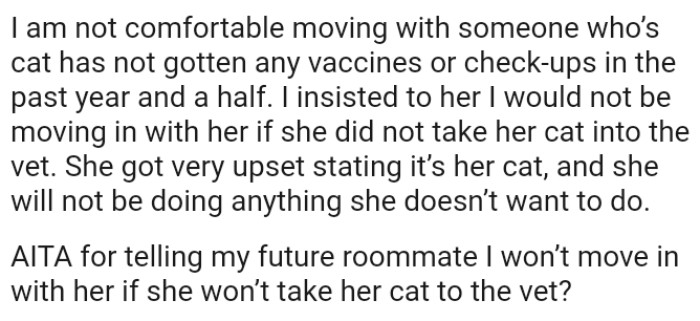
The Importance of Pet Care in Roommate Dynamics
Dr. Maria Lopez, a veterinary behaviorist at the University of Pennsylvania, emphasizes that pet ownership responsibilities should be taken seriously, especially in shared living situations.
Research shows that the well-being of pets can significantly impact the emotional health of their owners and others in the household.
Thus, ensuring proper care for pets is not just a personal choice but a communal responsibility that affects everyone in the living space.
The Role of Responsibility in Pet Ownership
This situation highlights the critical role responsibility plays in pet ownership, particularly in shared living environments.
According to research from the Journal of Applied Animal Welfare Science, pet owners must understand not only their pets' needs but also how their decisions affect others in the household.
Failing to vaccinate pets can pose health risks, which makes the decision to move in with someone who has a non-vaccinated pet a valid concern.
The OP made sure to pay her cat tax.

The original poster added this edit so people can know the situation of things.
For context, I am moving into her current apartment. She won’t have to get her cat into a carrier to move as it’s already there. (Her old roommate moved away, and I am moving into her old room.)
According to Dr. Dan Ariely, a behavioral economist, "Unvaccinated pets can create significant health risks not only for themselves but also for the humans around them." This concern is particularly relevant for roommates who may suffer from allergies or have compromised immune systems, leading to increased anxiety and discomfort in shared living spaces.
The anxiety surrounding unvaccinated pets can be linked to the concept of health anxiety, where individuals become overly concerned about potential health risks.
Studies in behavioral psychology show that this form of anxiety can manifest in various ways, including avoidance behaviors and heightened vigilance regarding health.
In this case, the request to take the cat to the vet reflects a proactive approach to mitigating perceived health risks.
Redditors headed straight to the comments to share their thoughts about the story, and here are some of the most upvoted ones below.

A determined cat can get out of a cardboard pet carrier.
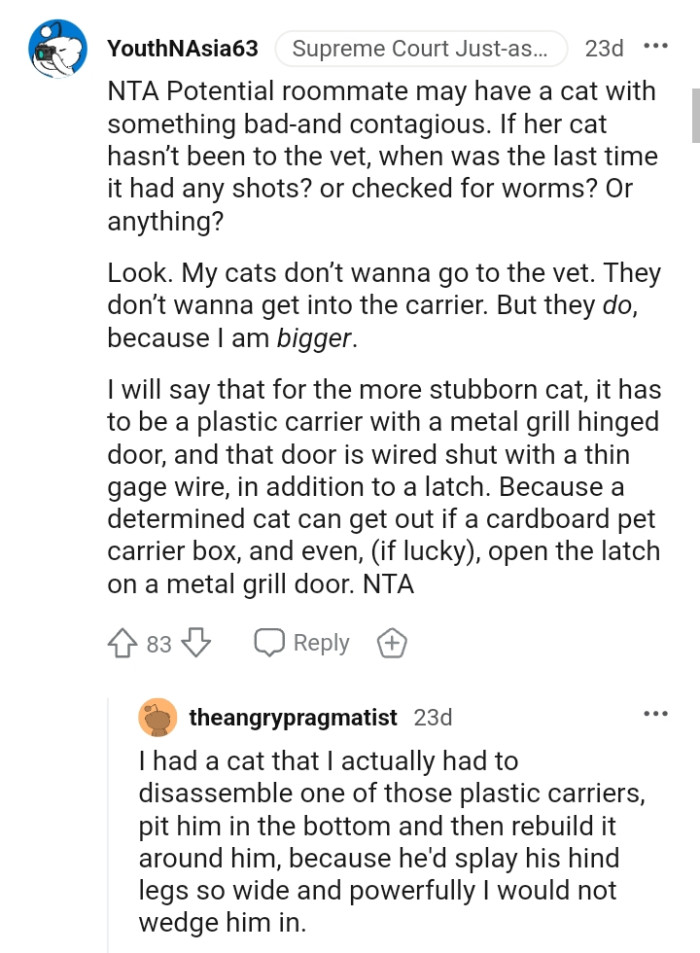
Health Risks and Shared Living Spaces
Health psychologists note that living in environments where health risks are present can lead to significant stress and anxiety.
Roommates may feel compelled to confront these issues, often leading to tension if one party is not aligned with health-conscious behaviors.
Establishing a common understanding of health responsibilities can mitigate conflict and promote a healthier living environment.
Communicating Health Concerns Effectively
Effective communication is essential when discussing health-related concerns in shared living situations.
Experts recommend using 'I' statements to express feelings and concerns without assigning blame.
For example, saying 'I feel anxious about the cat's health' can open the door to a more constructive dialogue than outright accusations.
OP's friend will literally have to get her cat into a carrier to move out.

The OP should wear thick long sleeves and put the friend's cat in the carrier for her.
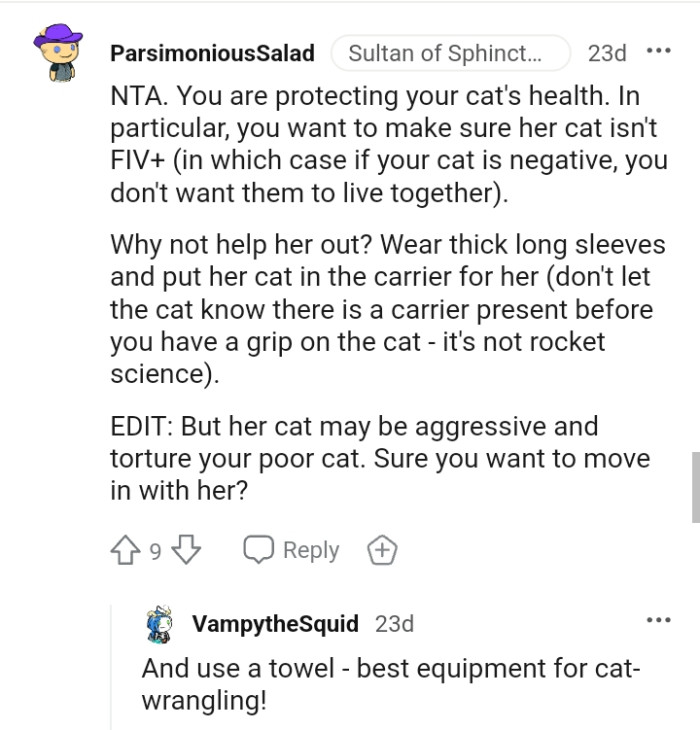
The OP can't force her, but at the same time, she can't live with her either.

To foster a cooperative living situation, roommates should engage in discussions about pet care and health standards before moving in together.
Setting clear expectations regarding pet vaccinations can create a sense of security and shared responsibility.
Additionally, forming a roommate agreement that includes pet care responsibilities can help clarify expectations and prevent future conflicts.
Moreover, establishing shared pet care agreements can alleviate tensions and clarify responsibilities.
Research indicates that collaborative agreements can enhance accountability and ensure all parties are on the same page regarding pet care.
Such agreements can include vet visit schedules, vaccination requirements, and shared costs for pet care, fostering a sense of teamwork.
Her poor cat ownership will cause the OP problems down the line.

It's affecting the relationship between them, and the OP wants to move forward.
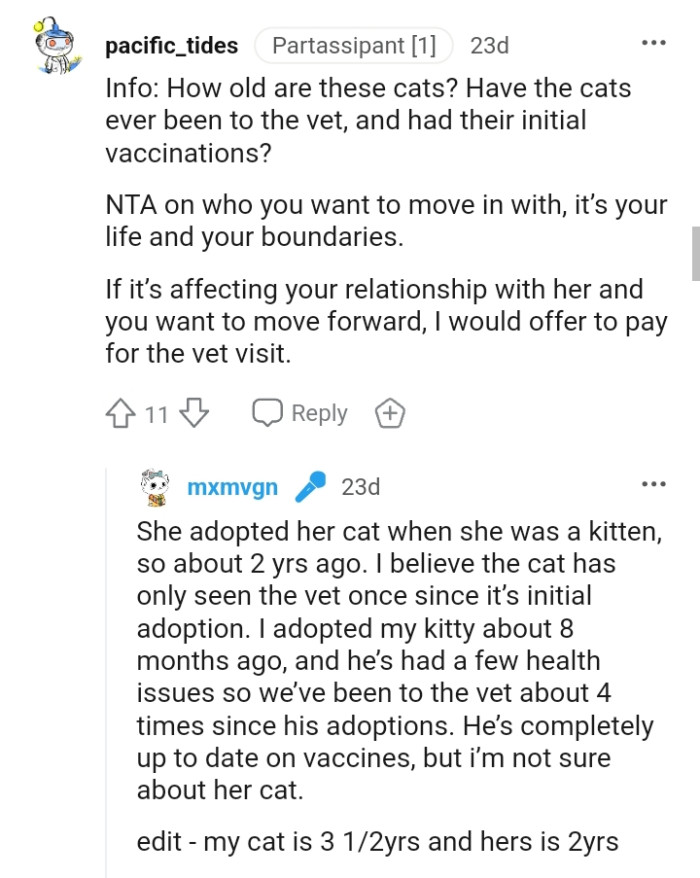
How is the friend's cat going to behave towards the OP's cat?

The Emotional Impact of Pets on Roommates
Pets can significantly influence interpersonal relationships in a shared living environment.
Research indicates that pets often serve as emotional support, but they can also become points of contention if their care is overlooked.
Understanding the emotional implications of pet ownership can help roommates navigate these dynamics more effectively.
Understanding the Emotional Impact of Pet Ownership
Pet ownership can elicit strong emotional responses, often tied to attachment theory, which highlights the bonds formed between humans and animals.
Studies show that these attachments can influence our well-being and how we relate to others in our environment.
In this scenario, the future roommate's attachment to her cat may evoke feelings of defensiveness when faced with concerns about its health.
A minimum of once-a-year visits to the vet are crucial for indoor cats. By doing this, you can ensure they receive the necessary vaccines and identify any potential health problems early enough to take appropriate action.
The OP's friend is neglecting this important fact, and Redditors supported the OP in her decision, so she was declared not the AH. Drop your own verdict in the comments section below.
Psychological Analysis
This situation underscores the importance of responsibility and communication in shared living arrangements, particularly concerning pet ownership.
Health concerns related to pets can evoke strong emotions, making it essential to address these issues with sensitivity and clarity.
Analysis generated by AI
Analysis & Alternative Approaches
Ultimately, moving in with someone who owns a pet requires careful consideration of shared responsibilities and health practices.
Research suggests that open dialogue about pet care can foster healthier living environments.
The key takeaway is that clear communication and mutual respect regarding pet ownership responsibilities are vital for maintaining a positive roommate relationship.
Psychological Analysis
This situation illustrates the critical need for transparency and agreement on pet care responsibilities among roommates.
When issues arise around health and safety, it's essential to address them constructively to maintain a positive living environment.
Analysis generated by AI
Analysis & Alternative Approaches
Pet ownership in shared living spaces requires clear communication and mutual understanding regarding responsibilities.
Research highlights the importance of establishing health standards to ensure a safe and harmonious environment for all residents.



